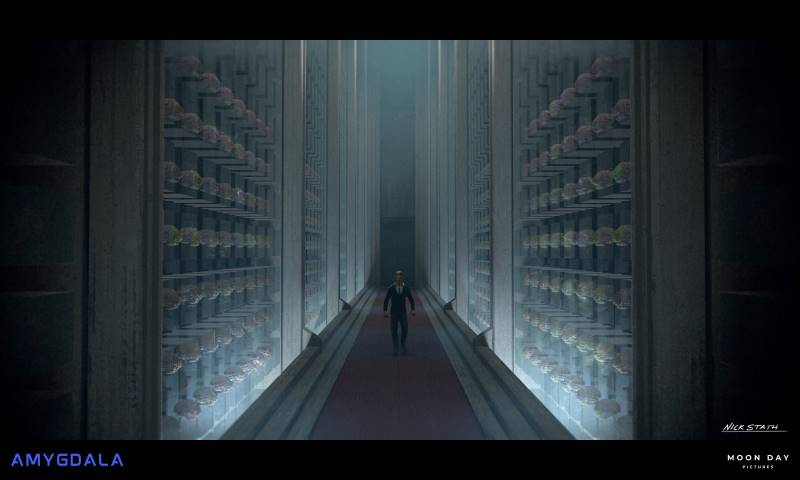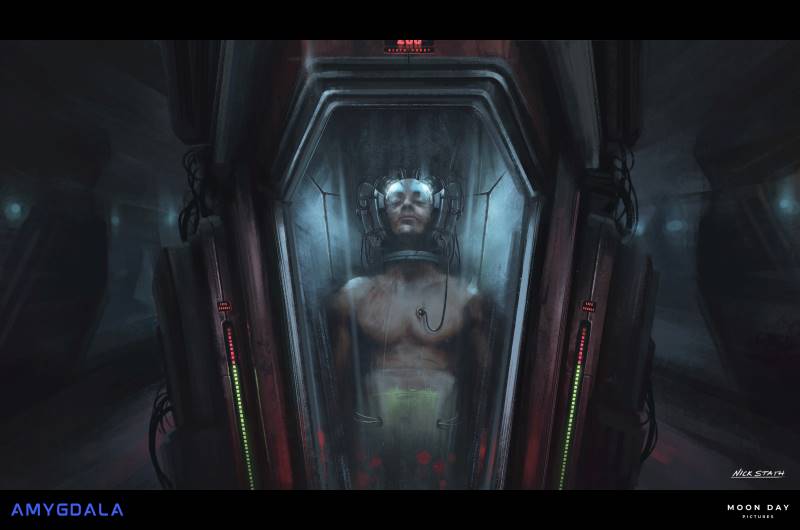How comedian/filmmaker Gary Eck plans to use cutting-edge technology to realise his sci-fi opus, Amygdala.
Note: don’t know the difference between NFT and NBA? Click Here
Gary Eck’s first encounter with the world of non-fungible tokens (NFTs) was one of trepidation: “My son wanted my details to buy an app to start generating NFTS of his own art. I was apprehensive at first, but soon it was me who was hooked, going down the rabbit hole, and by the end, I was saying ‘This is fucking genius!’”

In an act of strange serendipity, Eck’s exposure to this emerging technology happened to coincide with the development of his high-concept sci-fi feature film Amygdala. Set in a brutal dystopian future, Amygdala sees prisoners incarcerated in ‘Mindmares’, fiendish virtual realities that exploit their greatest fears, all of which are broadcast to bloodthirsty viewers.
With echoes of evocative films like The Running Man, Dark City, and The Matrix running through Amygdala’s veins, it wasn’t hard for Eck to find enthusiastic collaborators to come onboard his project.

While he was working with brilliant artists to create concept art and digital assets for the film, he was simultaneously delving into a world where people are selling digital art as, you guessed it, assets. For Eck, this confluence led to a no-brainer: what if you could monetise your pre-production to finance your film?
The standard lifecycle of a feature film is separated into distinct stages: pre-production, production, post-production, release, and finally, legacy. All stages come with their own disparate challenges, and a decision in one can radically change the outcome in another. But what if you could combine all of them? What if your pre-production could be the legacy of the film? This is the wild, and revolutionary idea at the core of Eck’s production.

For most filmmakers, the pre-production stage is a completely clandestine one: scripts are watermarked, concept art and pre-visualisations are hidden, and casting is done in secret – but not for Eck and his Amygdala team, who are selling NFTs rendered from the film’s pre-production materials, with the funds raised going directly into the production of the film itself.
The NFTs not only work as assets for the buyer, but they are also a ticket into the inner workings of the entire production. Holders of NFTs get access to the script, casting opportunities, behind-the-scenes access, and entry into multiple Amygdala-based competitions (including prop giveaways and premiere invites).
Eck’s model not only bridges the gap between the artist and the audience, but it has the potential to change (and monetise) the way we collect movie memorabilia. A central part of Amygdala world-building is the Mind Pod, a device that keeps the prisoners captive, and with Eck’s new interactive model, you can buy an individualised pod through NFT technology. Not only will you be an investor in the film, but the memorabilia you receive can be traded as an asset, and gain value over time.

This innovation may spark a new marketplace for film collectors who previously could only deal in physical media at markets, swap meets, and eBay.
Helping Eck realise this vision is a team of talented film artists and technology innovators. He has joined forces with blockchain specialists Sports Moments to deliver the film’s digital collectibles, and the project will also host a decentralized autonomous organisation (dao) for social interaction between members. There is even talk of a release of the film in virtual metaverse cinemas too.
Amygdala will not only give us a wild new sci-fi vision, but it may also lead to change in the way we see films forever.
You can get on board the Amygdala project here.